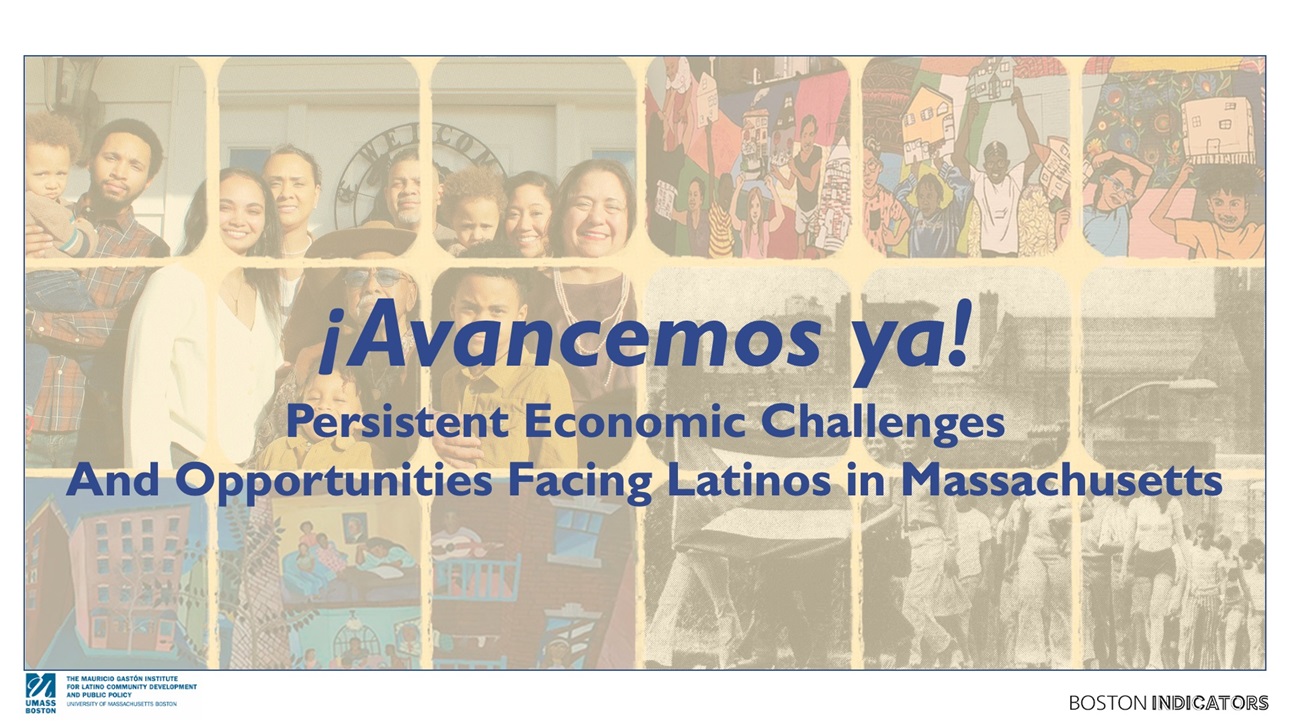¡Avancemos Ya! Advancing Latino Prosperity in Massachusetts
May 12, 2022
A lively Zoom forum united researchers, policy makers, academicians, government officials, business leaders and others in a presentation and conversation about the newly published report ¡Avancemos Ya! Persistent Challenges and Opportunities for Massachusetts Latinos. The report was produced jointly by researchers from Boston Indicators and The Mauricio Gastón Institute for Latino Development and Public Policy at UMass Boston.
The Latino Equity Fund hosted the event, which offered simultaneous interpretation offered in Spanish and Portuguese. LEF Director Evelyn Barahona kicked off the proceedings by setting forth the vision of the Fund and introducing Rosalin Acosta, Massachusetts Secretary of Labor and Workforce and former TBF Board member. After sharing a few additional labor statistics, she said, “What comes out clearly in this report is that you cannot sever the relationship between the success of the Latino community and the success of the Commonwealth.”
The data overview, presented by Boston Indicators Senior Research Manager Trevor Mattos, revealed some of the history and socioeconomic challenges of Massachusetts’ unique Latino communities. Latinos make up the second-largest ethnic group in the state and nation, but here in the Commonwealth the mostly native-born population has a low share of people with origins in Mexico, with most having family ties to Puerto Rico or the Dominican Republic. Seventeen percent are Central American, and of these 60 percent are foreign-born and have often faced particularly difficult immigration pathways to the U.S.
In addition, almost a quarter of Latinos in Massachusetts lived in poverty and had higher levels of unemployment even before the pandemic, when the economy was strong. Nearly one in four reported that food insecurity and rates of intergenerational economic mobility are low. In all these categories, Massachusetts Latinos fare worse than their peers nationally. Given a high concentration in frontline service jobs and in the hospitality industry, Massachusetts Latinos were hit hard by COVID-19, in terms of both finances and health. And yet, there were glimmers of hope in this report and a strong sense that by compiling and analyzing these data, and recognizing the immeasurable strengths and assets within those communities, real progress is within our reach.
WBUR Senior Arts & Culture Reporter Cristela Guerra led a panel to discuss the report and engage with audience questions submitted via the online chat. With passion and deep knowledge, Lawrence City Councilor Pavel Payano, McKinsey Partner Lucy Pérez, and UMass Associate Professor and Gastón Institute Director Lorna Rivera kept the interpreters on their toes with a rapid flow of insights, facts and ideas. They covered what surprised them (or didn’t) about the report and explored systemic challenges around race, housing, childcare, the digital economy, lack of philanthropic support for Latinos, and monolingual education policies.
But it was impossible not to keep coming back to the assets of our Latino communities. Among the opportunities facing the state now, the discussion highlighted the federal infrastructure bill as a way to drive positive change in both neighborhood improvements and Latino employment, how to build on successes to date, how to get legislators to act on changes they may so far only passively support, and how to better utilize the strengths of our Latino people and communities.
As Payano put it, “Being an immigrant community, we look at obstacles and we see opportunity and hope. We see struggle as just par for the course—which is both good and bad—and we strive for success.” The drive is there and the time is right, with a mismatch of employer needs and workforce skills, for initiatives to connect the players. Peréz shared that “so many of our clients are increasingly asking how to drive sustainable and inclusive growth. That naturally has to dovetail with the question of how we support Latinos, an economic engine in our country.” And this forum raised many possible ways to do that, from homeownership to education and immigration reform. “Start with universal child care beyond nine to five,” Rivera suggested.
LEF Co-Chair Juan Fernando Lopera closed the event, saying, “It is heartbreaking to see the challenges in this report, but I see it as a call to action.” Recalling his own father’s and others’ immigrant journeys, he said: “Tenacity, courage and initiative are what represent our community.” Indeed, when we repair systems so that our Latino communities may thrive, their resilience, creativity and entrepreneurship will—as Secretary Acosta’s equation attests—drive our state’s future growth.
Agenda
Welcome
Evelyn Barahona, Director, Latino Equity Fund at The Boston Foundation
Opening Remarks
Rosalin Acosta, Secretary, Executive Office of Labor & Workforce, Commonwealth of Massachusetts
¡Avancemos Ya! Research Presentation
Trevor Mattos, Senior Research Manager, Boston Indicators
Discussion & Audience Q&A
Cristela Guerra, Senior Arts & Culture Reporter, WBUR (Moderator)
Pavel Payano, City Councilor, City of Lawrence; Director of Community Mobilization, The Social Innovation Forum
Lucy Pérez, Partner, McKinsey; Co-Author, The Economic State of Latinos in America: An American Dream Deferred
Lorna Rivera, Director, Gastón Institute for Latino Community Development and Public Policy at UMass; Associate Professor, Women's, Gender, and Sexuality Studies, College of Liberal Arts at UMass
Closing Remarks
Juan Fernando Lopera, Co-Chair, Latino Equity Fund at The Boston Foundation; Chief Diversity, Equity and Inclusion Officer, Beth Israel Lahey Health

